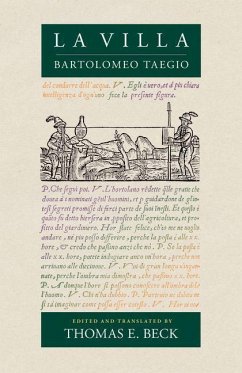Published in 1559 and appearing here for the first time in English, La Villa is a rare source of Renaissance landscape theory. Written by Bartolomeo Taegio, a Milanese jurist and man of letters, after his banishment (possibly for murder, Thomas E. Beck speculates), the text takes the form of a dialogue between two gentlemen, one a proponent of the country, the other of the city. While it is not a gardening treatise, La Villa reflects an aesthetic appreciation of the land in the Renaissance, reveals the symbolic and metaphorical significance of sixteenth-century gardens for their owners, and articulates a specific philosophy about the interaction of nature and culture in the garden.
This edition of the original Italian text and Beck's English translation is augmented with notes in which Beck identifies numerous references to literary sources in La Villa and more than 280 people and places mentioned in the dialogue. The introduction illuminates Taegio's life and intellectual activity, his obligations to his sources, the cultural context, and the place of La Villa in Renaissance villa literature. It also demonstrates the enduring relevance of La Villa for architecture and landscape architecture. La Villa makes a valuable contribution to the body of literature about place-making, precisely because it treats the villa as an idea and not as a building type.
This edition of the original Italian text and Beck's English translation is augmented with notes in which Beck identifies numerous references to literary sources in La Villa and more than 280 people and places mentioned in the dialogue. The introduction illuminates Taegio's life and intellectual activity, his obligations to his sources, the cultural context, and the place of La Villa in Renaissance villa literature. It also demonstrates the enduring relevance of La Villa for architecture and landscape architecture. La Villa makes a valuable contribution to the body of literature about place-making, precisely because it treats the villa as an idea and not as a building type.
Dieser Download kann aus rechtlichen Gründen nur mit Rechnungsadresse in A, D ausgeliefert werden.


